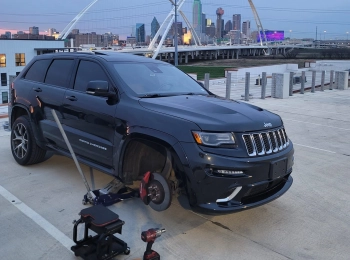Not changing the oil filter causes dirty oil to keep circulating through your engine, wearing down vital parts and eventually leading to costly damage. As the filter clogs, it stops trapping dirt, metal shavings, and sludge, which then grind inside the engine and reduce performance. Over time, this neglect can lead to higher fuel consumption, overheating, and even complete engine failure. This article explains the dangers of skipping oil filter changes, the warning signs of a clogged filter, and how replacing this small, inexpensive part protects your car’s long-term health.
Table of Contents
- What Does an Oil Filter Do?
- What Happens if You Don’t Change the Oil Filter?
- Common Symptoms of a Bad or Old Oil Filter
- How Often Should You Change an Oil Filter?
- Long-Term Consequences of Neglecting the Oil Filter
- The Benefits of Regular Oil Filter Changes
- Can You Change the Oil Without Changing the Filter?
- Final Thoughts: Why This Small Part Matters
- FAQs
What Does an Oil Filter Do?
An oil filter is one of the smallest yet most important parts of your car’s engine system. As oil circulates through the engine, it collects dirt, carbon buildup, and tiny bits of metal from regular wear. If left unchecked, these contaminants turn the oil into a gritty, abrasive fluid.
The oil filter’s role is simple but crucial: it traps these impurities before they can recirculate and damage sensitive engine components. Think of it as the engine’s protective barrier, keeping the oil clean so it can properly lubricate moving parts. When the filter is clean and working as it should, your engine runs smoother, stays cooler, and lasts longer. Without it, every mile you drive increases friction, wear, and the risk of breakdown.
What Happens if You Don’t Change the Oil Filter?
1. Dirty Oil Keeps Circulating
When the filter is clogged or old, it can no longer catch debris. That means dirty oil goes right back into the engine. Over time, the buildup of sludge and contaminants makes the oil less effective, reducing its ability to lubricate properly.
2. Reduced Engine Performance
An engine running on dirty oil will struggle. You may notice reduced acceleration, rough idling, or sluggish response. Contaminated oil increases friction, which makes the engine work harder and less efficiently.
3. Increased Wear on Engine Parts
Metal parts inside the engine, like pistons, bearings, and camshafts, depend on clean oil. If grit and dirt are allowed to circulate, they act like sandpaper, grinding away at metal surfaces. This accelerates wear and can shorten your engine’s life dramatically.
4. Oil Pressure Problems
When a filter clogs completely, it restricts oil flow. Modern engines are designed with a bypass valve that allows oil to flow around the filter when it’s blocked. While this prevents total oil starvation, it means unfiltered oil is circulating through the system. Over time, this can cause oil pressure fluctuations, engine knocking, or damage to internal components.
5. Risk of Engine Overheating
Oil doesn’t just lubricate; it also helps regulate temperature by reducing friction. Dirty or restricted oil can cause heat buildup, leading to overheating. Consistent overheating can warp engine parts and cause head gasket failure, a repair that often costs more than $1,000.
6. Shortened Engine Lifespan
Ultimately, neglecting oil filter changes leads to one outcome: reduced engine life. Instead of lasting 150,000-200,000 miles, an engine may fail far earlier, leaving you with either a huge repair bill or the need for a replacement vehicle.
Common Symptoms of a Bad or Old Oil Filter
If you’ve been skipping oil filter changes, your car may already be showing signs. Look for these warning symptoms:
- Dirty exhaust smoke – Excess debris in the oil can cause thicker, darker exhaust.
- Low oil pressure light – A clogged filter can restrict oil flow, triggering dashboard warnings.
- Engine sputtering or misfiring – Inconsistent lubrication can cause poor combustion.
- Metallic noises – If friction increases, you might hear knocking or grinding sounds.
- Overheating – Rising engine temperatures can be linked to oil circulation problems.
These symptoms shouldn’t be ignored. They often point to problems that worsen the longer the filter goes unchanged.
How Often Should You Change an Oil Filter?
The frequency depends on your car and driving habits, but most mechanics recommend replacing the oil filter every time you change your oil. That’s usually every 3,000 to 5,000 miles for conventional oil or 7,500 to 10,000 miles for synthetic oil.
Skipping filter changes may save a few dollars in the short run, but it increases the risk of much more expensive repairs later. Considering that filters are cheap and replacement is quick, it’s one of the most cost-effective maintenance steps you can take.
Long-Term Consequences of Neglecting the Oil Filter
Higher Repair Costs
Ignoring a filter replacement could lead to problems like worn-out bearings, damaged pistons, or even total engine failure. Repairs for these issues often cost $2,000 to $6,000, compared to the small cost of regular maintenance.
Lower Resale Value
A poorly maintained engine reduces your car’s resale value. Buyers and dealerships often check maintenance records. If oil filter changes were neglected, it could raise red flags about the overall condition of your vehicle.
Shorter Vehicle Life
Replacing a car before its time is expensive. Proper maintenance ensures your car lasts as long as possible, potentially saving you the cost of buying another vehicle sooner than planned.
The Benefits of Regular Oil Filter Changes
Changing your oil filter regularly isn’t just about avoiding problems; it also brings positive benefits:
- Better fuel efficiency – A clean filter helps the engine run smoothly, using less fuel.
- Longer engine life – Reduced wear means your car lasts longer.
- Improved performance – Acceleration, responsiveness, and overall drivability improve.
- Lower emissions – Cleaner oil burns more efficiently, producing fewer pollutants.
- Peace of mind – Knowing your car is protected gives you confidence on the road.
Can You Change the Oil Without Changing the Filter?
Some drivers try to save money by only changing the oil but keeping the old filter. While the car may still run, this defeats the purpose of fresh oil. A dirty filter contaminates new oil almost immediately, meaning you lose the full benefits of an oil change.
In short, fresh oil and an old filter don’t mix. If you’re going through the trouble of changing the oil, always replace the filter at the same time.
Final Thoughts: Why This Small Part Matters
So, what happens if you don’t change the oil filter in your car? You risk circulating dirty oil, damaging critical engine parts, overheating, and facing expensive repairs. Over time, neglecting this simple step could cost you a lot more than you’d ever spend on filters and routine maintenance.
Taking care of your oil filter is one of the easiest and most effective ways to protect your investment. For less than the cost of a dinner out, you can keep your engine running longer, stronger, and cleaner.The bottom line is simple: never skip the oil filter. It’s a small part with a big role, and replacing it on time will keep your car healthy, reliable, and efficient for years to come.
FAQs
What happens if you never change your oil filter?
If you never change your oil filter, dirty oil continues circulating through the engine, causing harmful buildup, overheating, faster wear, and eventually leading to serious engine damage or failure.
How often should I change my oil filter?
You should change your oil filter every time you change your oil. For most cars, that means every 3,000 to 5,000 miles with conventional oil or up to 10,000 miles if using synthetic oil.
Can a clogged oil filter cause low oil pressure?
A clogged oil filter can restrict the flow of oil to the engine. This often causes oil pressure to drop and may trigger the low oil pressure warning light on your dashboard.
Is it okay to change oil but not the filter?
Changing oil without replacing the filter leaves old contaminants trapped inside. These contaminants quickly mix with new oil, reducing its protective power almost immediately.
What are the symptoms of a bad oil filter?
Common signs of a failing oil filter include dirty smoke from the exhaust, a low oil pressure light, engine knocking sounds, higher temperatures, and reduced overall performance.
Can I replace the oil filter myself?
Yes, most car owners can replace the oil filter on their own. It’s a simple task that requires the right tools and knowing the correct filter size for your vehicle’s engine.
Does a bad oil filter affect gas mileage?
A dirty or clogged oil filter can hurt fuel efficiency because the engine has to work harder against increased friction, causing it to burn more fuel than necessary over time.










Leave a Reply